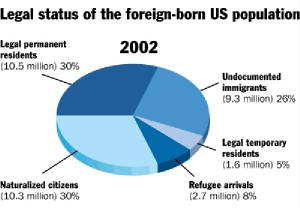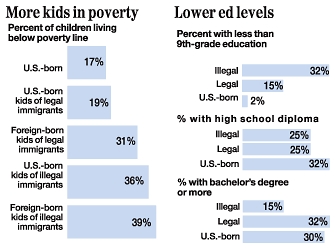|
There was a clear winter night not so long ago when I sat in a car, listening to the mechanical hum of the engine and heard
the story of how a particular individual ended up here. I listened intently, trying to pick out those things, which I recognized
about my native country, yet I had trouble. Amidst the descriptions of glorified escapes from poverty into a new and better
well being, did I hear a hint of bitterness? What must it be like to travel through the hot sun in fear of your life, only
to reach a world where you tell a story with a tone that betrays your disappointment? Half of me had started off questioning
his seeming love for this country. I was born here, and have lived here my whole life and can find plenty of flaws--how could
he speak of it as though the streets were paved in gold? It was something I couldn’t really fathom. The other part
of me was indignant that he could be so indignant when he was residing here illegally. Yes, he had the right to fair treatment
and a chance at a better life, but how dare he come here, into my country and home by illegal means and then complain about
it? I found myself torn, nearly so much as he seemed to be. So, I slid the car into gear and we drove, and talked about
other, less weighted subjects. Becoming exactly what we were meant to be, just another two people in the world.
Immigration Statistics.
The United States has often been termed as a melting pot or salad bowl. This is directly in reference to the fact that we
are made up almost completely of immigrants in some capacity or another. You can pinpoint nearly the whole Caucasian populace
of this continent back to Columbus and his “discovery.” So why is it that now, we make such a big deal about foreigners
entering our country. Do we feel as though we’ve filled our quota? Certainly, the world in general is becoming an over-populated
place, but do we – as a nation- seek to avert population-related dangers to regulating our acceptance of Oriental, European,
South American, or any other immigrants?
Figure 1.1 Pie Chart taken from (http://www.latinamericanstudies.org/immigration-charts-1.htm)
The pie chart above portrays the status of immigrants in the United States as of 2002. You’ll note that there were
9.3 million undocumented immigrants at this time. These are all people that didn’t go through the legal process of
maintaining any sort of legal status. This doesn’t necessarily mean they chose not to, because they may have had no
choice in the matter. There are people in other countries that obviously find the idea of living in America appealing. Their
reasons may be due to fact or fantasy, as the case may be, but when 26% of our population is &"undocumented," I believe that's
a good indicator that our immigration laws need to be reformatted. Perhaps, that means it’s time to make legalization
easier. After all, these are the people that pick our produce, build our houses, maintain our landscaping and do many other
tasks that most "Naturalized" citizens would never be caught dead doing. They boost our economy, and they're obviously not
going to stop living here, in "the land of the free."
Figure 1.2 Chart depicting immigration effects on kids
again, obtained from (http://www.latinamericanstudies.org/immigration-charts-2.htm)
Immigration isn't just something that affects people on an impersonal level. Sure, we hear about it on the news, we see
its effects from afar, and we think that it's not something that really makes a huge difference. However, it does. Regardless
of whether we like to think of it tomorrow, the youth of today are the makers of the future, legal or illegal as the case
may be. In the chart above, you can see that only 15% of illegal immigrants end up with a bachelor's degree or higher education.
This comes out of the 25% that even graduated from high school. Although it might seem simple to write this off as lack of
trying, or "bad breeding," you have to admit that in our country, despite our emphasis on fairness and education, we aren't
the most adept at putting the two together. It's difficult for illegal immigrants to have access to public education. Sure,
they can send their kids to school, but are they going to be able to ensure that their grades transfer? What happens once
they've hit the end of high school and their legal status prevents them from getting into college, regardless of grades or
ambitions? It's giving a taste of something sweet and then ripping it away. Referring back to the chart, however, we see
that the high school graduate rate of legal immigrants is also at 25%. What does that tell us? I believe that perhaps it's
saying that discrimination plays a role. Be it your accent, skin tone, or anything else that sets you apart as someone who
wasn't born here, people notice. The more malicious of these people try and stunt your opportunities because of it. If you're
a native of this country, it's pretty easy to breeze through high school and then go on to college if you should so choose.
When you have people downplaying your abilities at every turn, it's not nearly that simple. Being an immigrant in this country
may have its rewards, but it has its difficulties as well. My Opinion on the Matter Everyone has the right to
freedom. I, personally, also believe that everyone has the right to live where they choose to live. Guess that's not as
easy as it seems, what with country boundaries and political rifts. So, overall, immigration is not only something that should
be allowed, but something that comes naturally to people. If you live in a society where things are bad, where you're constantly
concerned over your family's well-being, if they'll have enough to eat, etc., then it's your natural instinct to try and find
a better place to be. If your people are being persecuted by a government that is power loving, and indifferent to your needs
as a citizen, you will naturally try to find a safe haven, is that not so?
I admit, I have my days. I've spent time in the presence of people who are not American by birth. Sometimes it's hard to
see a reason for them to be here, when they badmouth your country, or point out that they're the only people of a specific
race in a restaurant and proceed to obsess over how discriminatory the other diners are being (when they're not even paying
attention.), and then talk about you blatantly in their own language. Those are the times when I want to tell them to learn
my language if they're going to be in my country and to appreciate things a little more before they start badmouthing everything,
after all, they were the ones that wanted to be here. But then I curb my tongue and remind myself that it's their right here,
in America to say what they will. It';s their right to speak a language that isn't English. It's their right to feel strongly
about the position it's in, and I can’t object to these rights, because then I'm objecting to my own rights as well.
Synopsis
Immigration is a rough topic for people to cope with. I think this is because many people have conflicting opinions on the
matter. It's difficult to find the balance between resentment and understanding, but somehow we've managed to do it from Plymouth
Rock to Ellis Island and beyond. It's just a matter of putting things in perspective and trying to see things from another
individual's point-of-view. After all, here in America, that's the only thing that really should distinguish us- not our race,
our accents, our religious beliefs- but our individuality.
"A Whole New World"


|


